A hundred years ago Europe was in the middle of one of the ugliest, bloodiest wars the world had seen. Battlefield technology had advanced; battlefield medicine had not. Trench warfare saw millions of men killed for territory gains you could measure with a yardstick.
This was World War I, definitively called The Great War by people who didn’t know there would be a second Great War a mere two decades after the first one ended. Although few people knew it at the time, the old world of Kaisers and Tzars and Emperors was crumbling, and a new map was being established.
I mean this literally: look at all the empires that went poof! over the course of WWI and the subsequent peace treaties. This was a major, major remodel of the geopolitical world.
I am a bit obsessed with vintage WWI and WWII propaganda posters. Imagine it’s April 6, 1917, and you are living in some town in the middle of Kansas or Connecticut, more or less minding your our business. And then your country is at war. Actual, declared war.
(Without getting too political, World War II was the last declared war the United States participated in. We’ve fought and bombed plenty since 1945, of course, but not since WWII has the nation as a whole, as represented by our democratically elected representatives, stood up and said, “Yes, we will fight. We will go to war now.”)
In any event, it’s 1917 now, and every American is expected to do their part.
The young men are being recruited to fight.
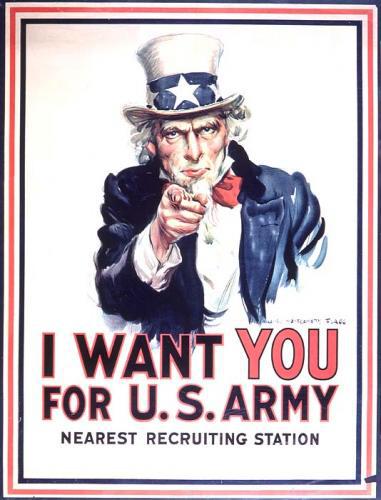
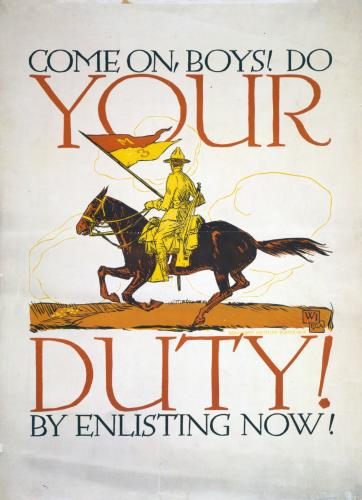
The young women are recruited, too:
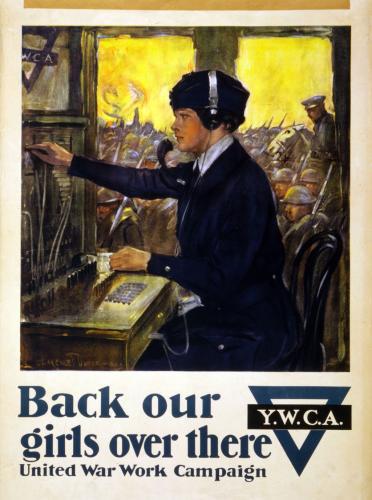
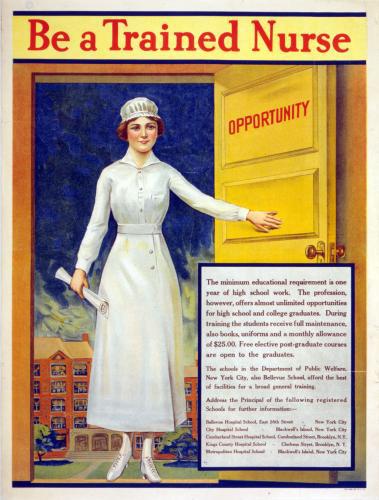
Even children are expected to do their part:
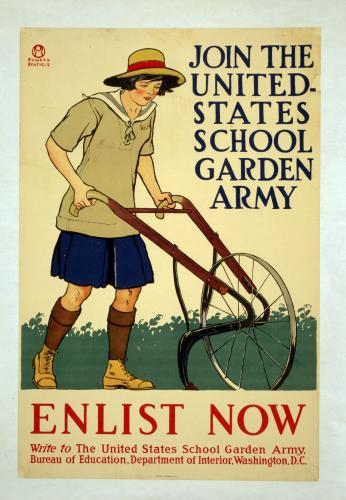
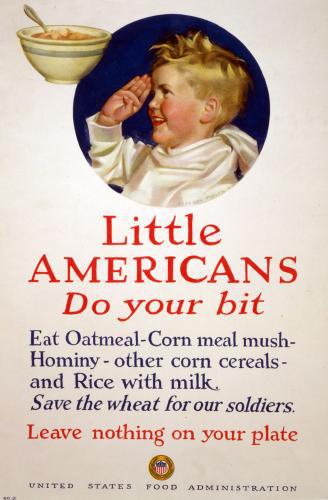
Every home is asked to contribute through buying War Bonds:
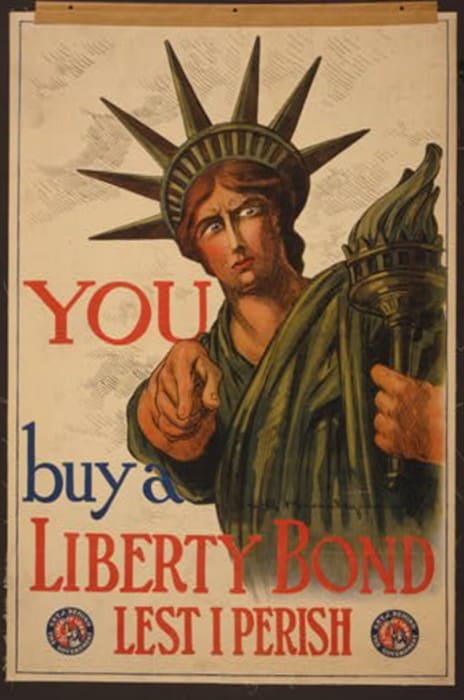
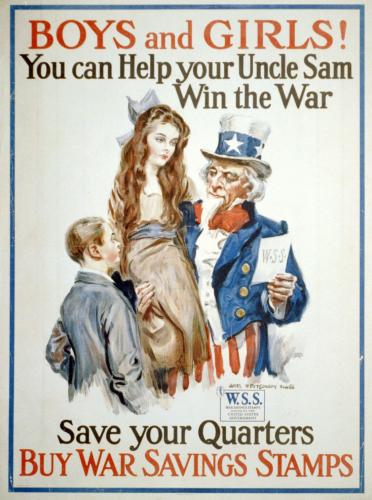
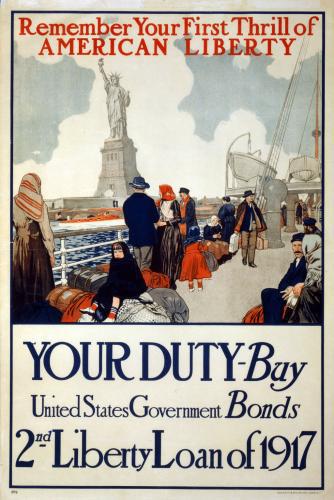
Note how this poster appeals to recent immigrants to the United States to support the war effort of their new home.
Families are encouraged to embrace gardening and other productive home tasks to reduce demand on national supplies that are needed for the war effort:
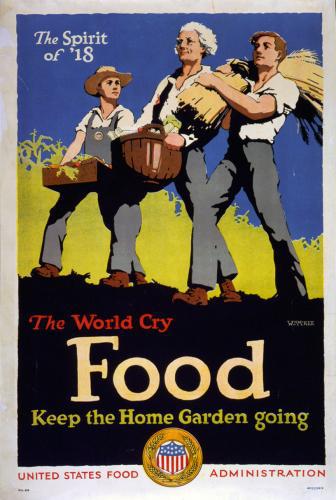
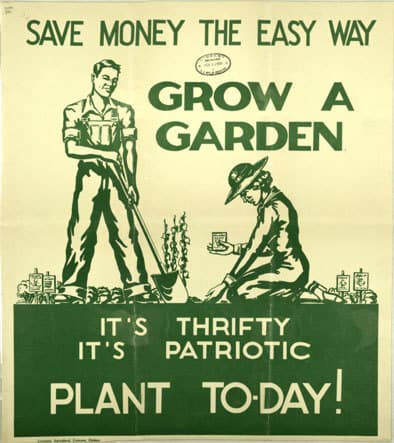
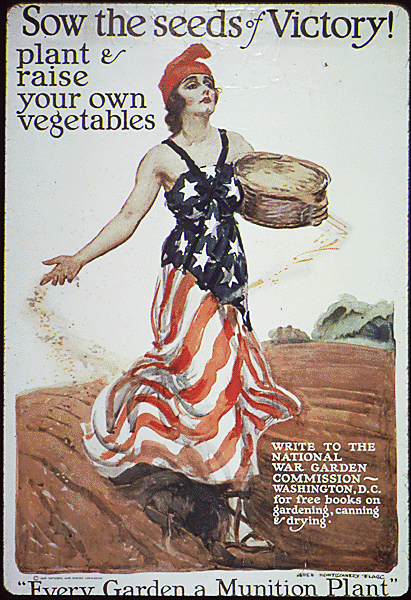
Backyard chicken keeping is promoted as thrifty and patriotic – a duty in time of war for everyone.

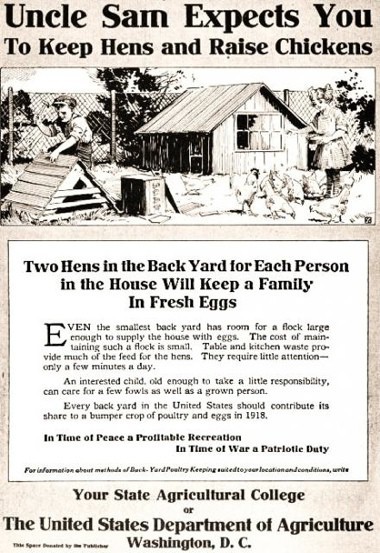
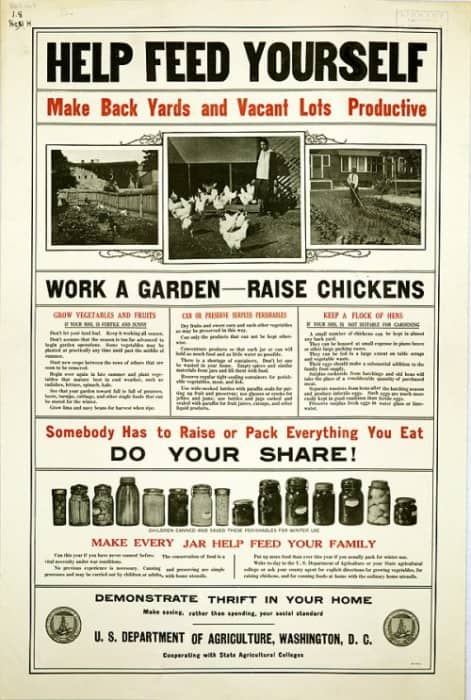
Rural kids are encouraged to join a sheep club and women are encouraged to “knit your bit” – both to help clothe overseas soldiers:
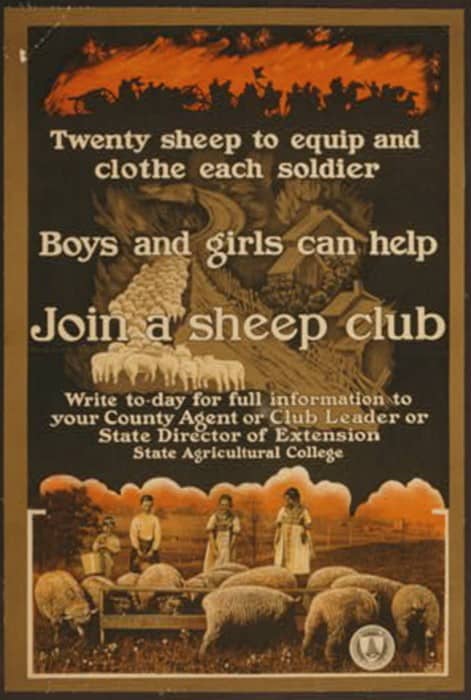
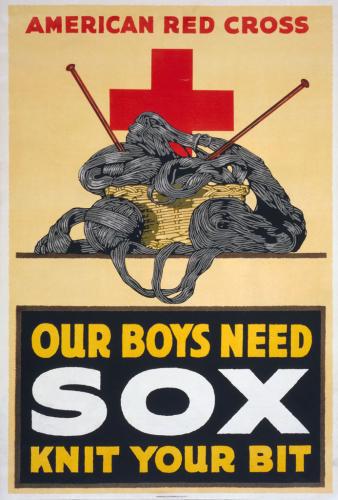
Perhaps above all – food waste is decried as a betrayal of our troops:
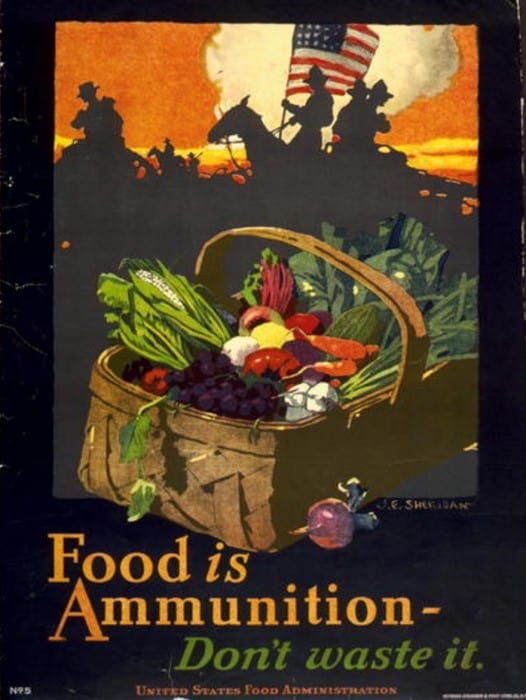
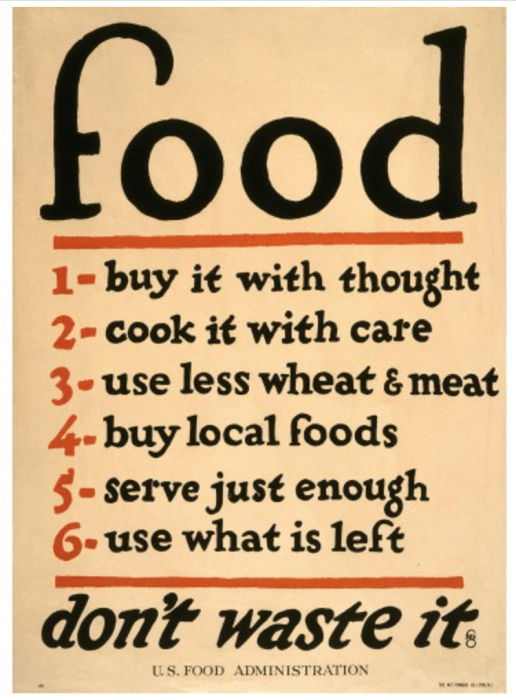
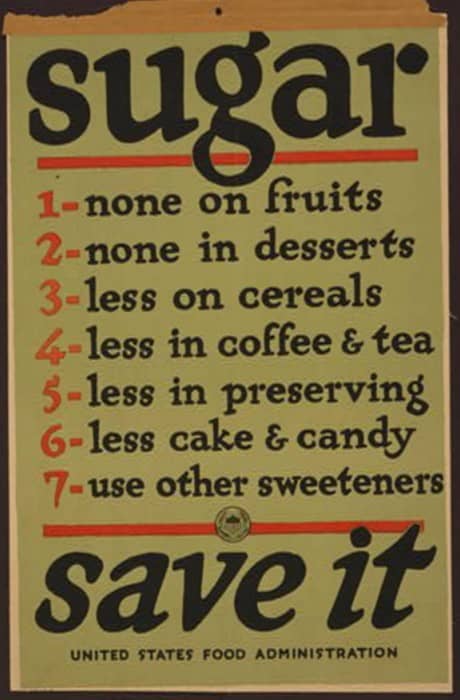
Food waste is a serious war concern. Enough food has to be shipped to Europe to feed our troops, and to help supply our allies who are, in many cases, literally starving.
War posters help explain the situation to Americans:
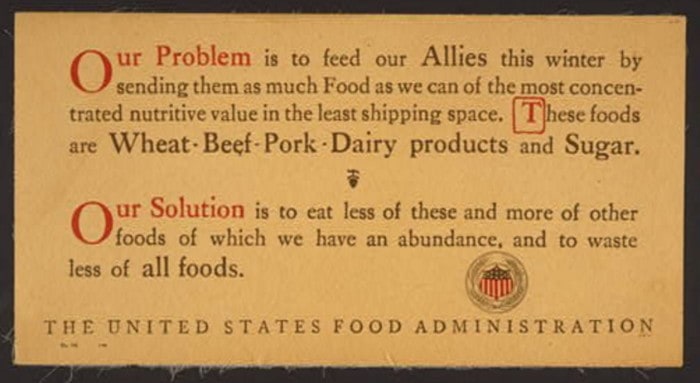
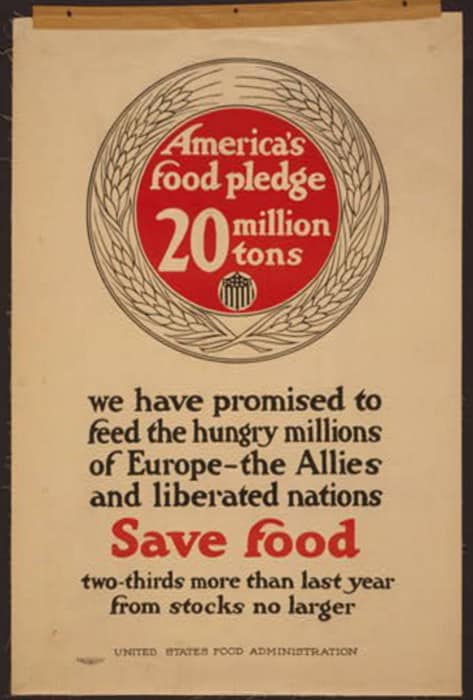
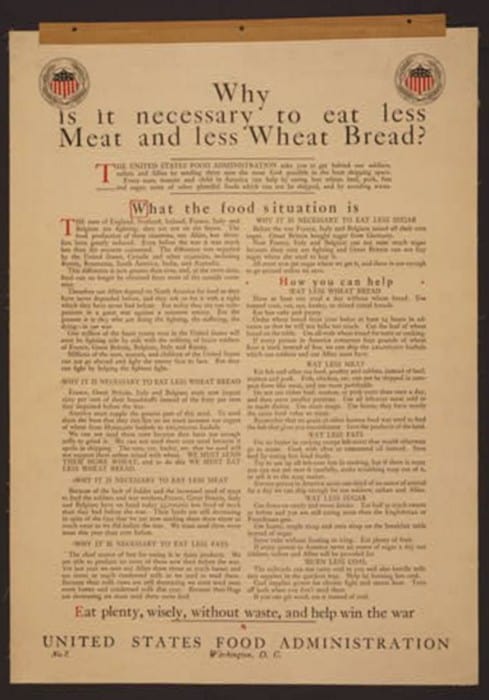
Every home is expected to tighten their belt. And the official messaging is not above emotional guilt-tripping to make sure people do:
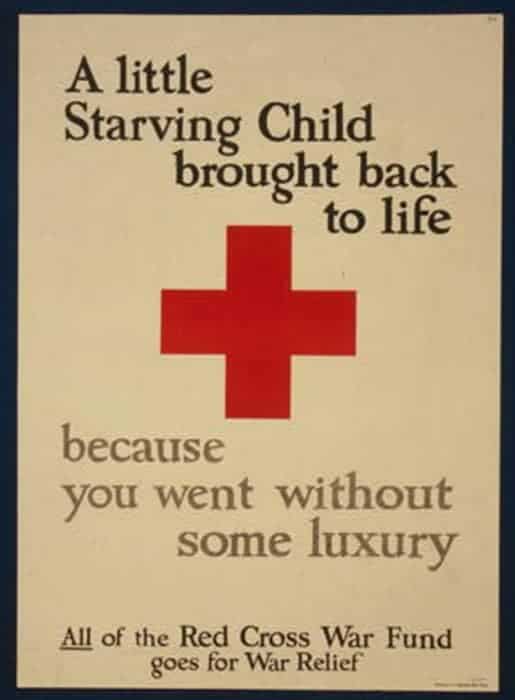
The Red Cross had a whole series of these. They were very direct.
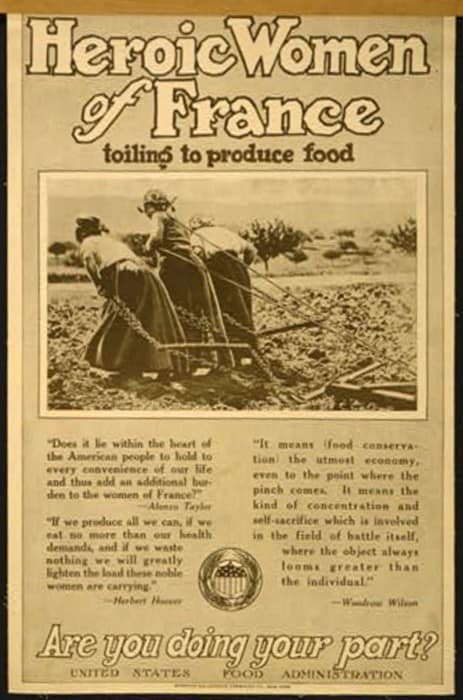
The messaging is that every home, by sacrificing a little bit, can contribute to the success of the whole nation. Every little bit counts:
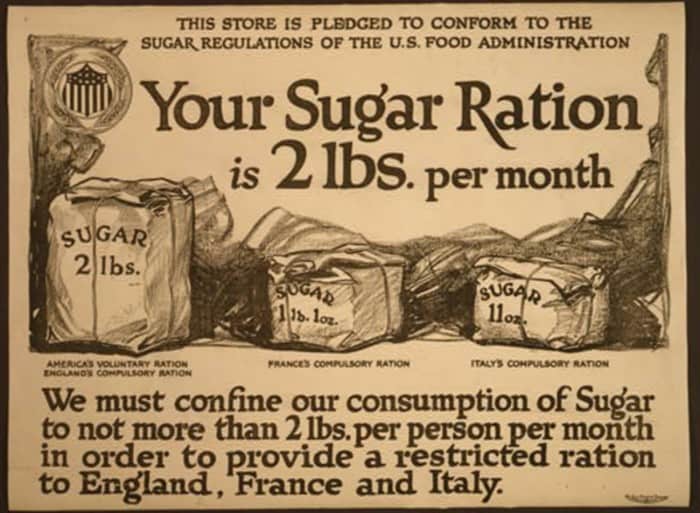
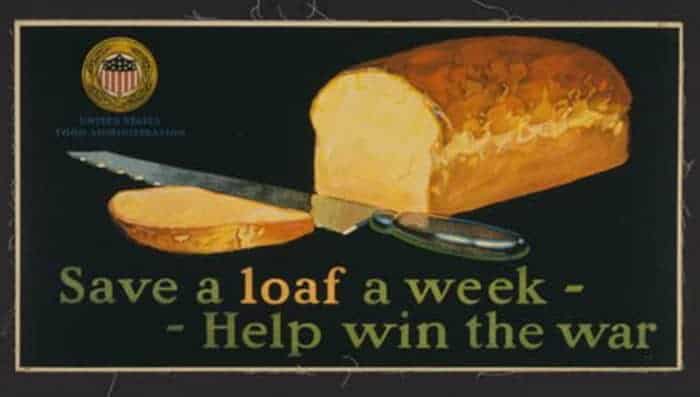
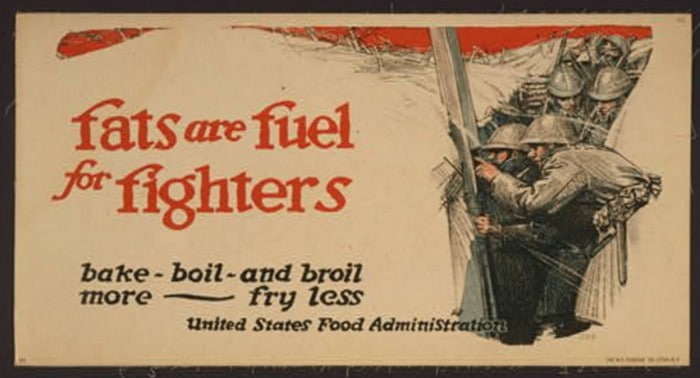
Now there’s really no point to this, beyond me thinking vintage war posters are awesome. But these posters do allow us a fascinating look at what the promoted cultural values were at that point in time.
Now I’d argue that the promoted values of the country have shifted quite a bit in the last hundred years. Just as a mental exercise, how many wars do you think the United States would participate in today, if doing so meant every American was expected to actively contribute to that war effort through thrift, conservation and direct funding?
46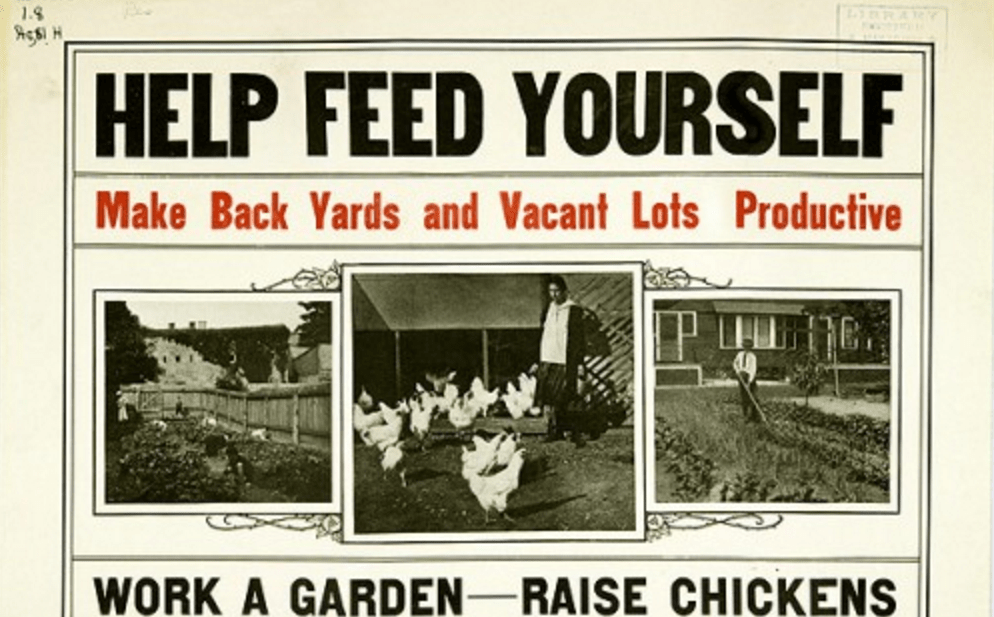
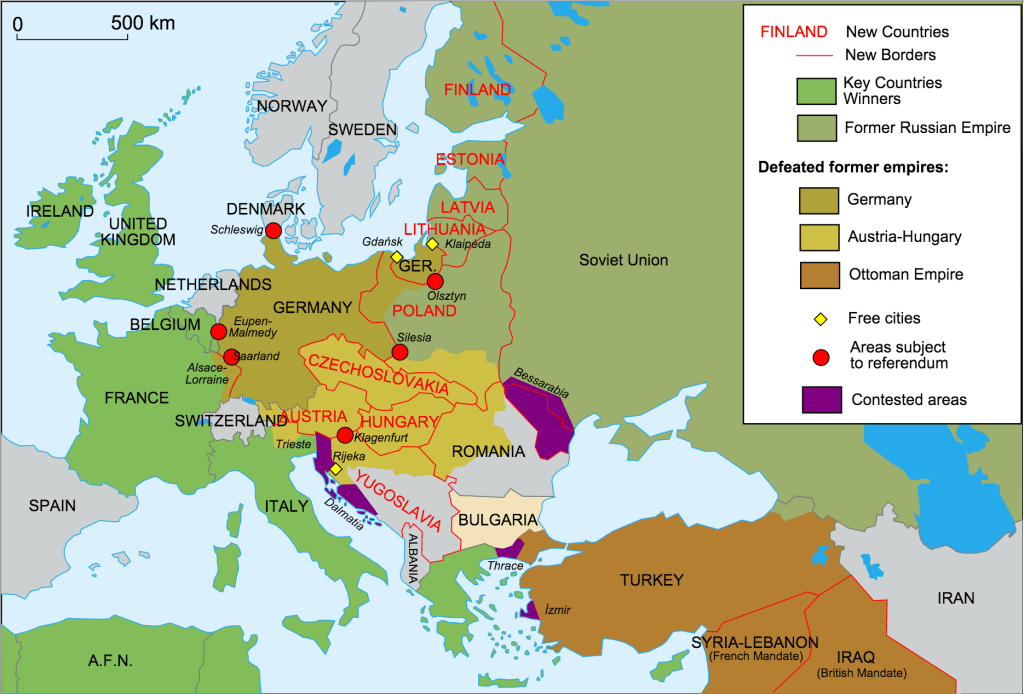
Very awesome and informative post, Erica. It surely makes me think about my own dietary excess and how much I take for granted. It also reinforces my practice of providing my own food as much as I can via my gardens, canning, and chickens.
Thanks Mary!
2 Pounds of sugar per person per month???? yikes! I must buy a bag of sugar every 6-12 months for a family of four. Clearly, I’m not baking enough. I need to remedy that right away!
A lot of that was probably used for food preservation.
I love WWI posters too and did a big paper in college on propaganda in the first world war. I agree our culture has changed drastically. But for me, I grew up on books by Eleanor Estes and others from that era so it was very real and present for me. I’m now reading the same books to my children. 🙂
I’ll have to look into those books – thanks for mentioning them.
I really enjoy reading these pieces. Of course, then I got to thinking about what a time that must have been when the whole nation was so focused dedicated to this cause. And then I got to thinking about what horrible catastrophe would have to happen to get this nation to even come close to that again…..and that was scary. So I went out and fed my chickens and started feeling a little better.
Yes, indeed! Feeding chickens and tending gardens is balm for a worried soul. 😀
Right? We can’t even get behind the cause of entire town of people poisoned by their city’s water. And that’s our own people! What would it take to make everyone sacrifice a little bit for those in other countries? Have we lost that much of our community? Have we lost our value of civic-mindedness?
And there I go, down the rabbit hole.
I hope not – and I don’t think so. Americans pull together when an outside threat confronts us. We always have. But I would really hate to experience a threat large enough to make that happen.
I also wonder what I would have thought in that era. Would I view this with sincerity or skepticism? I don’t think people and populations change that much over time; natural tendencies just seemed to be checked in a moment of national fervor.
I have wondered if the current interest in gardening, homekeeping, permaculture, etc. is a way of processing 9/11 and, maybe more so, the cultural breakdown that followed. There is obviously a lot more going on economically and environmentally that contributes, but I think we’re still seeing the ripple effects of that full stop.
Hmmm. Interesting. 9/11 certainly made a lot of people re-think how they were spending their lives, what it all means, etc., – so could be. But post 9/11 I think the US (and world) were quite united. That all fell apart of course, but we did initially come together in the face of the attacks. I tend to think it’s more about the financial crash of 2007-2008. Gardening, etc. always goes up when financial times get tight.
Back-to-the-garden and away from ‘the machine’ movements are as old as civilization. I got the message in the early seventies, Scott and Helen Nearing were active in the thirties. Urban Athenians in Plato’s time waxed nostalgic about a mythical Acadia.
Yeah that’s true – I actually said something similar in the intro to my book. But when the economy tightens, more people garden for food, and when times are good, less do. That’s pretty well documented. I think there are often triggers for these things – the 1970s were years of huge inflation and oil shortages. No wonder people looked around and thought the promise of modernity had failed.
I always thought it was a shame that right after 9/11, when the nation was itching to do something (Red Cross had to say – STOP! We don’t need any more blood right now) the only thing we were asked to do by our leaders was:
go shopping.
There was a huge missed opportunity for social engagement. For a brief period, we were all one nation, all pulling together, all wanting to believe in something.
This is interesting stuff! It’s fascinating to extrapolate from these posters what the average family ate then. And really, the suggestions being made are pointing people not only in the direction of saving money and contributing to the war effort, but also being healthier!
I downloaded a bunch of old cookbooks to my Kindle quite a while ago. Some were written during war years and they sounded very much like these posters! Some of the food sounded very unappetizing but it was reading all of the advice. For some light, interesting reading, I highly recommend war years cook books. It gives you insight into their lives.
I’m gonna track some down, thanks! I’ll also recommend an old YouTube channel called Great Depression Cooking. Not quite the same era, but fascinating, and Clara from the show was so lovely!
i love Clara so much! yay!
Another clue is in the census of 1910 about 55% of the population was rural. By 2010 that was down to 19%. The urban areas, or course, grew. So my guess would be people were eating much more locally on average. There were refrigerated train cars but those primarily moved produce and meat from production areas to urban areas. It wasn’t the hub-and-spoke model that allows for modern food distribution. The USDA tracks production and consumption numbers of key foodstuffs. If I find a link I’ll add it.
LOVE this! Why do we need war to do the right thing? Do you ever listen to Radio EcoShock? Alex Smith had a guest once who advocates a global mobilization to deal with climate change, with the the same sense of both urgency and willingness to sacrifice and pull together that people get in war time. http://radioecoshock.org
Correction: the link to this excellent blog and weekly podcast / radio program is http://ecoshock.org for the blog, and http://ecoshock.info for the podcast.
Thank you Ien. “Why do we need war to do the right thing” and the corollary – what if it wasn’t possible to wage war without the whole country on board? Wouldn’t that be interesting? 🙂
I haven’t listened to EcoShock but I’ll check it out, thanks!
Although it does have it’s downsides, I think it is a testament to our industrial food supply that these messages seem quaint and out of our realm of our experience. In the last 100 years the world population has gone from 1.8 billion to 7.4 billion and 3 times as many people now suffer from being overweight (1/3 of the worlds population) as suffer from being undernourished (11%) What a transformation.
Very good, fair point. While it’s easy to feel like everything is going to hell, actual markers of third world poverty, childhood death rates, hunger and such are all moving in positive directions. And in the first world our issues are always distribution, access and/or quality, never a shortage of total calories.
However, one does have to acknowledge that the expansion of industrial food production is only possible on the back of cheap fuel. In some cases, more petrol calories are used to grow the food than food calories are provided by the food. In the long run, that’s a shell game I fear will hit the poorest hardest.
I don’t disagree, industrial agriculture has lots of quality and environmental issues and it’s always the poor that are hit the hardest. I loved your post and the posters are terrific. I think we are all nostalgic for a time when things seemed simpler and our efforts could make more of a difference. It’s amazingly empowering and enlightening to have a hand in making your own food etc. I think it is why I am drawn to so many DIY projects in an era when you can have anything delivered directly to your door.
For good videos on global development stats you should check out Hans Rosling, he is on a mission to get us caught up with what is really going on in the world. I find him very entertaining https://www.ted.com/talks/hans_rosling_shows_the_best_stats_you_ve_ever_seen or his website http://www.gapminder.org/videos/
Thank you for the link – I will definitely check Rosling’s work out.
I often look around at my neighbor’s manicured yards and wonder what would happen if they were forced into sudden self-sufficiency (let alone contribute to larger food needs). How different would our world be if everyone made more of an effort – as someone else noted – without the need for war to do the right thing. It would certainly make a dent in chronic disease prevalence, for starters.
Love that poster collection, Erica. I know you’re potentially too busy to watch TV, but that show Homefires on PBS has made me want to order some victory garden posters!
I hadn’t heard from Homefires, but I’ll look into it. I do actually watch a fair bit of TV in the winter but almost all of it is while I’m doing dishes or something. Thanks for the suggestion.
I think it’s just a lot easier to survive without expending much physical effort now. And honestly, that’s kinda an amazing feat of civilization, if you think of it – like Kristina was saying upthread. With increasing automation, it will only become easier to live that way. But that comes at a cost of course – more narrowly concentrated wealth, loss of natural resources and the older skills, boredom and social isolation, etc. As a world we’re going to have to decide if the cost is worth it.
My land grant university (Iowa State) boasts an interesting history, including connections to George Washington Carver and Carrie Chapman Catt (suffragist). Once while doing some research on the latter I discovered in ISU’s digital collections a series of cookbooks which were sold to raise money for the suffragist movement. I thought it was an interesting juxtaposition — using a traditional message on homekeeping and cooking to sell people on the idea of the vote for women. But then I reconsidered and thought, “How wonderfully insidious!” The recipes were submitted, which was also fascinating. The author Jack London submitted a recipe for Risotto Milanese. Talk about being way before your time!
I think it’s quite interesting how foodways and folkways have also been used throughout history as tools for social change.
Three times a day(ish), people gotta eat. Lot of opportunities to shift spending and nudge values during those windows. 🙂 I adore that story about the suffragette cook book! Thank you for sharing. I’ll have to see if Iowa State has made those collections available online to the general public.
This just made me sad! I live in one of those annoying planned developments where the HOA bans chickens and vegetable beds in the front yard. I wish our society cared more about self sufficiency. I’m going to plant a pumpkin and some pretty kale in the front just to flout the rules!
What is interesting how much some of these reflect current advice for environmental and health reasons…specifically, eat less meat, wheat, and sugar. I’m currently trying to stick to the new recommendation of no more than 10 grams. Damn, that’s hard!
A lot goes into what homes people choose, but I believe an HOA situation is typically a bad one for homesteady-minded folks. Good luck sneaking some veggies in! Show them food can be pretty. 😀
I LOVE this! I’ve often thought about the huge shift in values of our culture in the last century, and about how it has been decades since there’s been any real shortage of anything. The posters you collected were highly entertaining, as well as impressive in number. Thank you!
Thanks Starla, yeah it’s amazing how much has changed.
if they tried to ration food like before i think there would be blood in the streets. several times when i’ve been buying canning jars and an older lady will ask me if i’m really canning food. inevitably she will tell me that folks now couldn’t handle ‘hard times.’ it’s happened a few times and is always a very interesting conversation. it always makes me wonder what would really happen if we were in a WW3 situation and what people would have to give up. it should be patriotic to grow your own food.
I hate to agree, but I think rationing in modern US society would require a strong police presence to enforce. Based on the behavior of some people on Black Friday, and the way local groceries get gutted before a storm, I think we’d have literal food riots. Spooky stuff.
I loved this post, thank you. Especially the “Food” poster which sums up everything so concisely, from buy local to don’t waste.
Isn’t it crazy how complicated we make everything related to food, when it really comes down the same stuff we knew 100 years ago?
Erica, I have been following you for a while and really appreciate your intelligent take on providing food for ourselves and the fact that you are doing it in the city. I have the gardening and chicken raising bug in me as well, which I think was passed on by my grandparents. I was not born in the US, but have moved here 13 years ago. I do live in a HOA but have a backyard garden/raised beds which I continue improving year after year. I am a single mom to a boy of 6 and I want to teach him where food comes from, the importance of knowing what we put in our bodies and respect for the food. It is such a pleasure to dig for potatoes, or pick green beans and tomatoes or snap asparagus and eat it right there in the garden. He loves it all. Dare I say i even have a couple chicken that just started laying eggs and we are both in heaven over this. I am nostalgic over the old time when my mom would do days of canning and preserving in the fall. Our garden doesn’t provide enough thoug, it is mostly eaten fresh. I do hope one day to take the plunge and move to a farm. I do not blog but read a lot of blogs learning from them and adapting the learnings to my personal beliefs. Yours is the one that draws me in the most, the one I can relate to the most. I am getting ready to plant some more asparagus as well as the onions and garlic. I have had very poor luck with greens though so I am resigned to potatoes, tomatoes, cukes, zukes, eggplant, peppers, green beans and melons. The one watermelon we grew last year was out of this world! This post with all the war era posters was aboslutely FANTASTIC. I come from one of those European countries and have heard my grandparents tell war tales.
Thank you for your kind words, Christiana. As a fellow mom, I truly believe that even a small garden can teach kids big things – your son is a lucky guy with you as a mom. It sounds like you live someplace with some sun and heat to get all those tomatoes and watermelons ripe- the good news with all those fruiting crops is when they produce, they do give you a ton. Thank you very much for reading. I’m glad you are here! 🙂
My father is 90 years old. He tells stories. They are important stories all be it simple stories. They were very poor growing up in West Haven, Connecticut. They grew their own food, grapes for wine and had a cow and chickens all on a quarter acre of land. They had an out house. He must have gotten an infection from the animals because he lost some of his eyesight as the doctors say today. He grew up in the “depression era” when they did not believe in any waste and they saved everything. My mother passed a year ago Dec. 19th from Alzheimers. She grew up on a bigger farm with 5 brothers. My grandfather sold the vegetables at the ‘farmer’s market” every week in New Haven. The entire family contributed to supporting this farm including the moonshine that I heard was made in the barn. ;-). My mother always had a garden and grew lots of vegetables as I was growing up. There was no waste there either.
Americans throw away thousands and thousands of pounds of food. Retailers do the same. Why is there so much waste? It’s sickening.
I try to grow my own food as best I can on a quarter acre of land in the city of New Haven, Connecticut. I am allowed 6 hens and I have 5 in a beautiful coop built for me by my dad at age 87. Every year my gardens grow.
I hope to move to a “bigger farm” in the next few years and expand my chickens and add goats etc. In the mean time I recognize, when I go to the house I grew up in, with my mother no longer there, and my dad who is 90, why he saves every piece of used tin foil and zip lock bag……..
I’m sorry for your loss of your mother. Alzheimer’s is a particularly difficult way to say goodbye. Thank you for sharing your parent’s stories here. There’s a lot still to learn from that generation.
We do waste so much – about $2000 a year worth of food for the average family of four. I think about what ELSE that kind of money could buy for that same average family: health care, savings, debt reduction, vacation, college savings…it’s just one of many ways food waste hurts us.
Good luck getting your farm!
Regarding what people would do if shortages, and other challenges, materialized, I’d suggest reading ‘A Paradise Built in Hell’ by Rebecca Solnit. Based on a professor’s extensive research, it recounts how people actually responded in various big catastrophes.. the San Francisco Fire, the Mexico City earthquake; a ‘tsunami’ in Halifax, and others. I’m putting my money on our better angels… Mad Max et al ‘fantasies’ be damned 😉
Also, I loved your maps!! Learned so much so easily 🙂 Thanks.
The Oregon Historical Society currently has an exhibit on these posters if you fancy a road trip:
http://www.ohs.org/museum/exhibits/the-art-of-war.cfm
They have also had two fascinating WW2 exhibits. They were “war” oriented, of course, but also showed what people were doing on the home front. I went several times just so I could overhear older people talking to each other about what they experienced 🙂
Another interesting and educational post, Erica. Thank you for all the hard work on it and for raising so many interesting points. Also a lot of thought provoking comments and I’d much rather sit at my computer with my coffee than reading the Sunday paper. I was inspired to rummage in my cookbooks for my WW2 ration cookbooks and a book given to me that I’ve never really looked at from the 20’s about meat curing. I thought there may be some patriotic prompts in the meat one but it is from the Morton Salt company and is a really sterilized guide to butchering with plenty of ads for their products thrown in too. Presumably the war time cook in the 40’s probably had access to more goods than the WW1 cook and maybe they didn’t go quite as hungry. However I know my modern family would never eat most of the ration recipes.
I am afraid my opinion of our current society tends to favour more of what you proposed with memories of Black Friday carnage and suggestions that enforcing rations would have to be policed. I’m certainly no ‘prepper’ but do believe in making the most of the food I work so hard to grow or purchase and hate to have to send anything to the compost because I was so foolish as to let it go to waste in the fridge. You provide such important information here on the blog and also in your book towards teaching people to reclaim their own responsibility toward the running of our homes, thank you.
That was so cool to read! I just wish in our current times they’d put the pressure on for chickens. I can’t have them in my part of the city. 🙁 Thanks for sharing these posters and the look back!
Magnificent web site. A great deal of helpful info here. I am just sending
it to some pals ans also sharing in delicious. And obviously, many thanks in your sweat!